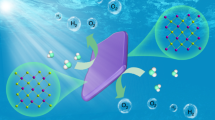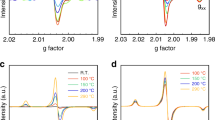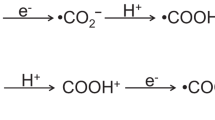Abstract
FUJISHIMA and Honda1 have indicated that TiO2 can be used in a photoelectrochemical cell to decompose water with band-gap light (hν ⩾ 3.0 eV). This process, termed photoelectrolysis, could have important implications for solar energy conversion and the ‘hydrogen economy’ if use can be made of visible light.
This is a preview of subscription content, access via your institution
Access options
Subscribe to this journal
Receive 51 print issues and online access
$199.00 per year
only $3.90 per issue
Buy this article
- Purchase on Springer Link
- Instant access to full article PDF
Prices may be subject to local taxes which are calculated during checkout
Similar content being viewed by others
References
Fujishima, A., and Honda, K., Nature, 238, 37–38 (1972).
Anderson, W. W., and Chai, Y. G., Energy Conversion (in the press).
Möllers, F., Tolle, H. J., and Memming, R., J. electrochem. Soc., 121, 1160–1167 (1974).
Gerisher, H., in Physical Chemistry, An Advanced Treatise, IX A (edit by Eyring, Henderson, and Jost), 463–542 (Academic, New York, 1970).
Wrighton, M. S., Ginley, D. S., Wolczanski, P. T., Ellis, A. B., Morse, D. L., and Linz, A., Proc. natn. Acad. Sci. U.S.A. (in the press).
Author information
Authors and Affiliations
Rights and permissions
About this article
Cite this article
NOZIK, A. Photoelectrolysis of water using semiconducting TiO2 crystals. Nature 257, 383–386 (1975). https://doi.org/10.1038/257383a0
Received:
Accepted:
Issue Date:
DOI: https://doi.org/10.1038/257383a0
This article is cited by
-
Hole utilization in solar hydrogen production
Nature Reviews Chemistry (2022)
-
Electroactivity of the hybrid material composed of poly(3-hexylthiophene) and titania nanoparticles synthesized by electrochemical process
Bulletin of Materials Science (2022)
-
Photoelectrochemical visible light zero-bias hydrogen generation with membrane-based cells designed for decreasing overall water electrolysis voltage and water dissociation: the second stage
Journal of Applied Electrochemistry (2019)
-
Identifying the key obstacle in photocatalytic oxygen evolution on rutile TiO2
Nature Catalysis (2018)
-
Light on the path
Nature Catalysis (2018)
Comments
By submitting a comment you agree to abide by our Terms and Community Guidelines. If you find something abusive or that does not comply with our terms or guidelines please flag it as inappropriate.



